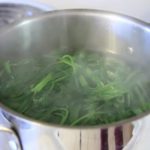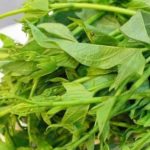Here are the 3 cheapest, cleanest, and healthiest vegetables in the market this season:
Amaranth
Amaranth is a common vegetable in Vietnam. It is easy to grow and can grow wild in many corners of the garden, making it very cheap. However, this inexpensive vegetable is rich in nutrients and is good for your health.
According to Eastern medicine, amaranth has a sweet taste and a cool nature, has a good cooling effect, and is used to treat prickly heat, acne, and infections and to lower body temperature during hot weather. The antioxidants in amaranth, such as vitamin C and vitamin B3, also help reduce inflammation and prevent the risk of infection from microorganisms in the environment from entering wounds.
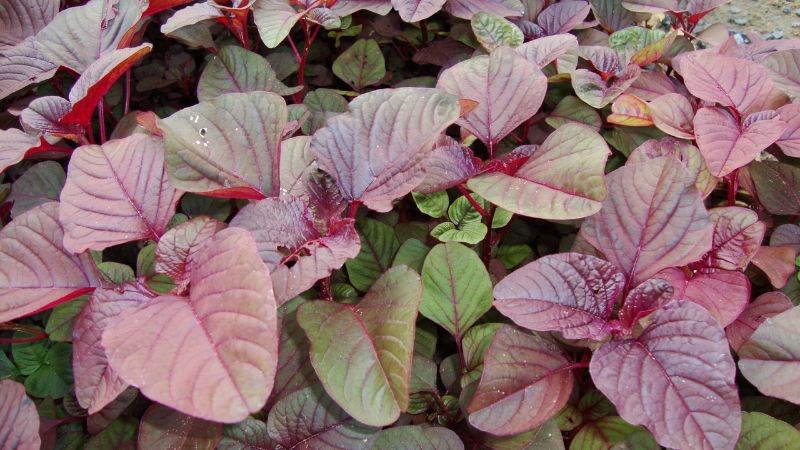
Amaranth, a familiar dish on every family’s dining table
According to modern medicine, amaranth is rich in minerals, carotene, protein, vitamin C, vitamin A, and other nutrients. These substances help improve eyesight and prevent night blindness. At the same time, Amaranth provides a large amount of calcium. Regular consumption of this vegetable helps strengthen your bones, teeth, and nails, reducing the risk of osteoporosis and fractures in the elderly.
The rich fiber content in amaranth helps lower blood fat and blood sugar levels, creates a feeling of fullness, and reduces cravings. Moreover, the calorie count in this vegetable is very low. Therefore, amaranth is very suitable for people with high blood pressure, diabetes, and obesity
Amaranth is a food suitable for all ages, from children to middle-aged people and the elderly. It is rich in calcium, iron, and vitamin K, can promote blood production, helps maintain normal heart function, and prevents muscle spasms.
For middle-aged and elderly people, and patients with anemia, this is a great choice to add to their diet. The iron content in amaranth is quite high, with every 100 grams of red amaranth containing about 11.8 mg of iron.
Malabar spinach
Malabar spinach is rustic, easy to find, and easy to buy, yet it is a delicious and healthy vegetable. In the past, this vegetable was used in many medicinal recipes that have the effects of cooling the body, detoxifying, reducing liver heat, and eliminating the symptoms of acne and prickly heat.
Both Eastern and Western medicine confirm that this vegetable has a laxative effect. According to Eastern medicine, Malabar spinach has a cold nature and a sour taste, disperses heat, cools the blood, is a diuretic, detoxifies, beautifies the skin, and effectively treats prickly heat and acne… making it very suitable for the hot season.
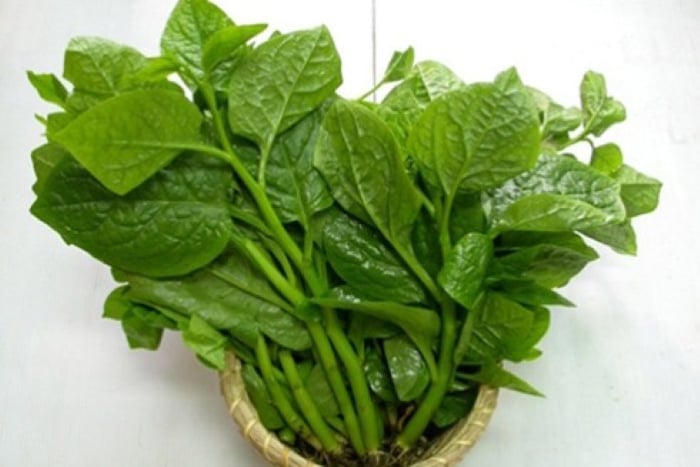
Eating Malabar spinach helps cool the body, detoxify, and reduce liver heat
Studies have shown that Malabar spinach contains the very valuable mucilaginous substance pectin, which can be used to prevent and treat many diseases. The mucilage and fiber in Malabar spinach also have the ability to stimulate intestinal蠕動, thereby reducing indigestion, bloating, constipation, etc. Malabar spinach is low in calories so you don’t have to worry about gaining weight, making it suitable for obese people and those who gain weight easily.
Malabar spinach contains a lot of fiber (about 2.1 in 100g of Malabar spinach according to the USDA), pectin…, which has the ability to cool the liver, thereby effectively improving liver function.
In addition, Malabar spinach is rich in vitamin A, which is good for the eyes, and is also rich in antioxidants that neutralize free radicals that are harmful to the body.
Sweet potato leaves
Similar to other vegetables, sweet potato leaves can be processed into familiar dishes in various cooking styles such as stir-frying, boiling, or making soup… They are both easy to eat and good for your health.
In Eastern medicine books, sweet potato leaves are a non-toxic herb with a neutral nature. They have the effect of replenishing health, enhancing eyesight, promoting bile production, and treating jaundice… Sweet potato leaves are a rich source of vitamin B6, vitamin C, and riboflavin…
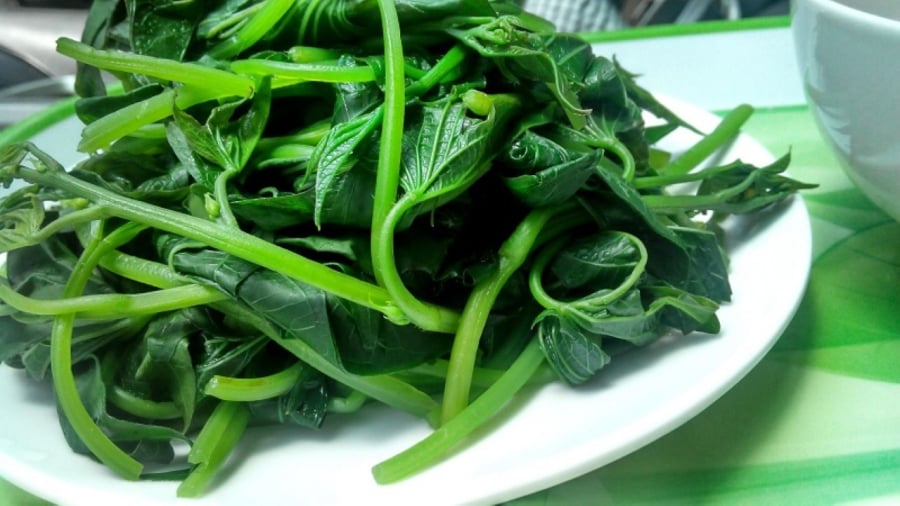
Sweet potato leaves are both easy to eat and good for your health
In modern medicine, sweet potato leaves are a rich source of vitamins more so than sweet potato tubers because they contain 10 times more vitamin B10, 5 times more vitamin C, and 3 times more vitamin B6.
100g of sweet potato leaves contain typical nutrients such as: 22kcal of energy, 91.8g of water, 2.6g of protein, 2.8g of starch, 11mg of vitamin C, 900mg of vitamin BB; minerals such as: 48mg of calcium, 54mg of phosphorus, 2.7mg of iron…
The vitamin C content in sweet potato leaves is very high, which is a natural antioxidant that helps fade dark spots, whiten the skin, nourish the skin, and fight aging.
Sweet potato leaves contain a large amount of vitamin C and flavonoids, which can help the body detoxify, enhance the activity of immune cells, and improve human immunity.
Sweet potato leaves are high in fiber, so eating them regularly can promote gastrointestinal蠕動, enhance digestive function, and facilitate the elimination of waste products. Therefore, if someone is suffering from constipation, they can eat sweet potato leaves to improve their condition.
Modern medicine believes that sweet potato leaves are very rich in protein and mucilage, which help strengthen the immune system, help prevent arteriosclerosis, and reduce the risk of cardiovascular disease. At the same time, sweet potato leaves are very rich in carotene, which can be partially converted into vitamin A in the body, which helps improve eyesight and prevent night blindness.
Amaranth is rich in nutrients such as minerals, carotene, protein, and vitamins C, A, and B3. It offers health benefits such as improved eyesight, stronger bones and teeth, lower blood fat and sugar levels, and reduced inflammation.
Malabar spinach has a cooling effect on the body and is known for its detoxifying properties. It is rich in pectin, a valuable substance that can prevent and treat various diseases. It also contains mucilage and fiber, which improve digestion and reduce constipation.
Sweet potato leaves are a rich source of vitamins, especially vitamin C, and are known for their antioxidant properties. They help improve digestion, enhance immunity, and promote healthy skin by reducing dark spots and fighting aging.
























